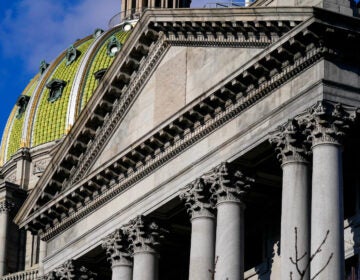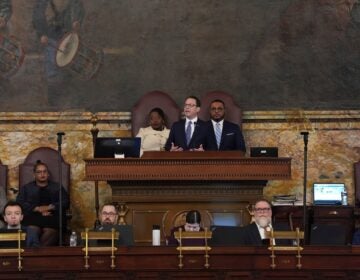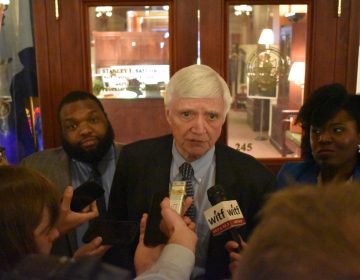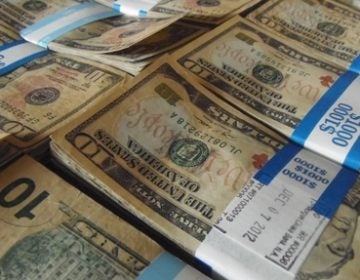Philly-area education leaders and nonprofit providers breathe a sigh of relief after Pa. Legislature approves a budget
Education leaders are applauding new funding increases that promise to bridge the divide between high- and low-income school districts.
Listen 1:06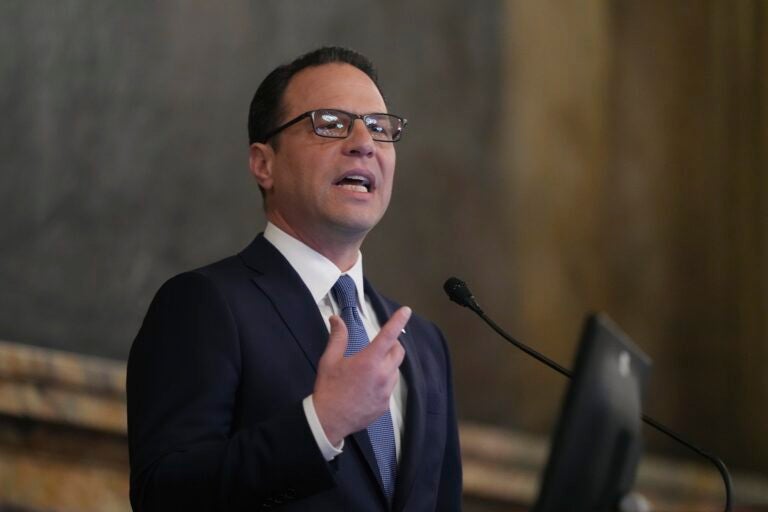
Pennsylvania Gov. Josh Shapiro delivers his budget address for the 2025-26 fiscal year to a joint session of the state House and Senate at the Capitol, Tuesday, Feb. 4, 2025, in Harrisburg, Pa. (AP Photo/Matt Rourke)
From Philly and the Pa. suburbs to South Jersey and Delaware, what would you like WHYY News to cover? Let us know!
Pennsylvania legislative officials have reached an agreement on a roughly $50.1 billion state budget, ending a monthslong stalemate that left schools, counties and nonprofit service providers in limbo well past the July 1 start of the fiscal year.
The deal increases overall spending by nearly 5% and shifts hundreds of millions of dollars toward public education, while also delivering a key policy concession to Senate Republicans on climate regulation.
Gov. Josh Shapiro said the compromise was essential.
“I would’ve loved to have stood here in this room with all of you on June 30,” Shapiro said Wednesday afternoon. “Pennsylvania is just one of only three states in the country with a divided legislature. It requires all of us to compromise, to have tough conversations and ultimately to find common ground.”
The impasse, which lasted more than four months, stemmed from competing priorities within the General Assembly. House Democrats pushed for major investments in education and social services following a landmark court ruling that declared the state’s school-funding system unconstitutional. Senate Republicans resisted new recurring spending and opposed proposals to raise revenue through legalized cannabis or expanded gambling. With neither side budging, schools and county agencies warned of borrowing, furloughs and delayed services as the stalemate dragged into the fall.
‘No excuse’ for the late budget
Educators and nonprofit leaders in the region expressed relief that funding spigots will be turned back on, albeit more than 130 days past the deadline.
Arthur G. Steinberg, president of the Philadelphia Federation of Teachers, said he was “glad” that the budget impasse was resolved, but also criticized the legislature for forcing local school districts to find stopgap measures to keep things running.
“There’s no excuse for it,” he said. “In Philadelphia alone, they had to borrow money that’s going to cost them $30 million in interest, which could be put to a lot better uses — librarians, teachers, nurses, paraprofessionals — and that pattern was repeated throughout the state.”
However, he added that he was pleased that Democrats in the legislature held firm on education funding. Under the new budget, districts across the state — especially those with high rates of poverty and low property-tax bases — will see a significant increase in state aid that targets closing the so-called “adequacy gap.”
“That takes that over to a billion dollars to help bring kids in poorer school districts up to par with the wealthier districts,” Steinberg said, who added that Philadelphia “got a nice bump.”
Christopher T. Dormer, superintendent of Norristown Area School District, said the new budget “eases months of anxiety related to both our daily operations and to the implementation of our multi-year facilities master plan.”
“As one of the most historically and chronically underfunded school districts in the Commonwealth, the full investment of adequacy and tax equity supplements this year will have a meaningful impact for the students, families, and staff of our district,” he wrote in a statement.
Lawmakers also approved long-sought changes to cyber-charter school funding, a move expected to reduce tuition payments from traditional districts to online charters by an estimated $178 million. Steinberg said those funds could be used to address the teacher shortage.
Social services on the edge
Beyond the classroom, nonprofits contracted by state and local governments to provide assistance related to homelessness, mental health and other social services also expressed relief that a deal had been agreed to. However, they say the budget stalemate destabilized some of the state’s most essential services and caused long-term damage.
Dr. Jeannine L. Lisitski, CEO of Mental Health Partnerships, said her organization had to rely on an expanded line of credit to stay afloat.
“Even on our best day, the nonprofit sector is really strained,” she said. “You get to a point where your line of credit is at the end. You have to worry about whether you’re going to be able to pay staff.”
She added that while larger organizations like hers were fortunate to have credit to fall back on, many smaller groups and shelters may never fully recover — and the loss of staff poses a serious threat to their long-term stability.
“Once they’re gone, that’s it, they’re gone,” she said. “And we lose that expertise. It just destabilizes the whole entire provider community and our ability to respond to the people that need it.”
Jennifer King, executive director of the Council of Southeast Pennsylvania, said the delay threatened to derail critical recovery-support programs. Several counties informed her agency that payments could be cut by 50% — or eliminated entirely — starting this month.
“It was starting to be a time of real concern,” she said. “We had to do some real planning for when this would impact payroll.”
King said the uncertainty posed a unique threat because recovery workers are themselves in recovery.
“It’s not just that services would be paused,” she said. “Engagement and trust would be rocked … and a disruption to staff who are in recovery would’ve been really concerning.”
Lisitski said she thinks it’s unfair that service providers aren’t paid while state employees are, adding that she would like to see politicians go without pay during budget impasses as a way of motivating them to find a resolution.
“We’re definitely going to advocate that something changes for the future,” Lisitski said. “We should never have to go through this again. We’d really like Harrisburg to see the impact on people who don’t have a voice. We see the anguish in their eyes when we tell them we don’t have a place for them tonight. And I just want the legislators to see that and the [Shapiro] administration to see it and to treat it like it’s a top-level emergency.”
Lisitski also noted that the new budget reflected a “small” decrease in funding for mental health services.

Get daily updates from WHYY News!
WHYY is your source for fact-based, in-depth journalism and information. As a nonprofit organization, we rely on financial support from readers like you. Please give today.



